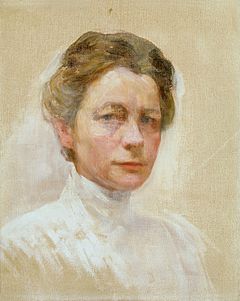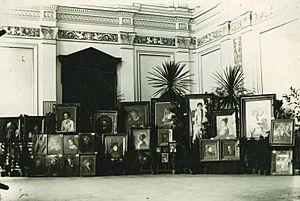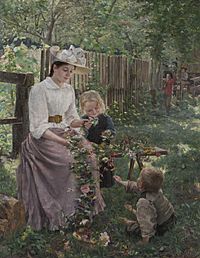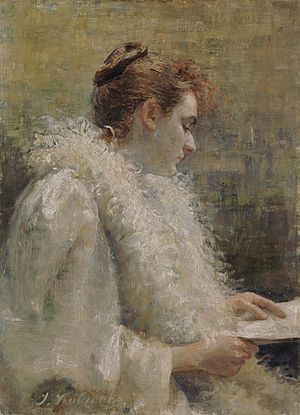Ivana Kobilca facts for kids
Quick facts for kids
Ivana Kobilca
|
|
|---|---|

Self-portrait in White, around 1910
|
|
| Born |
Ivana Kobilca
December 20, 1861 Ljubljana, Carniola, Austrian Empire
|
| Died | December 4, 1926 (aged 64) Ljubljana, Kingdom of Serbs, Croats and Slovenes
|
| Nationality | Slovene |
| Education | School of Arts and Crafts, Munich study with the portrait painter Alois Erdtelt |
| Known for | Painting, drawing, photography |
|
Notable work
|
Dutch Girl (1886) Zitherist (around 1887) Coffeemadam (1888) Portrait of Sister Fani (1889) Summer (1889-90) Women Ironers (1891) Children in Grass (1892) Parisian Woman Selling Vegetables (1892) Self-Portrait (1894-95) Self-Portrait with a Palette (1914) |
| Movement | Realism |
| Elected | Société Nationale des Beaux-Arts |
Ivana Kobilca (born December 20, 1861 – died December 4, 1926) was a very important painter from Slovenia. She is known as the most famous female painter from her country. Ivana Kobilca was a realist painter. This means she painted things in a very lifelike and detailed way.
She studied and worked in many big cities across Europe. These included Vienna, Munich, Paris, Sarajevo, Berlin, and her hometown, Ljubljana. Ivana mostly used oil paints and pastels for her artworks. She painted many different subjects. These included still life (pictures of objects), portraits (pictures of people), and scenes from everyday life. She also painted allegories and religious scenes.
Ivana Kobilca's Life Story
Ivana Kobilca was born in Ljubljana, which is the capital city of Slovenia. Her family was quite wealthy, and her father was a craftsman. Her parents believed that education was very important for their children.
Ivana first learned how to draw at the Ursuline High School in Ljubljana. She also learned French and Italian there. When she was 16, she went to Vienna with her father. There, she saw many paintings by old master artists. These paintings inspired her greatly.
From 1879 to 1880, Ivana studied in Vienna. She copied paintings at the gallery of the Academy of Arts. Then, from 1880 to 1881, she studied in Munich. She continued her art studies under a teacher named Alois Erdtelt from 1882 to 1889.
In 1888, Ivana showed her paintings in a public exhibition for the first time. At another exhibition in Munich, a famous German art historian, Richard Muther, noticed her work. He praised her paintings very much.
After her studies, Ivana traveled and painted in many places. In 1890, she painted in Zagreb. She spent time painting in Paris in 1891 and 1892. While in Paris, she became an honorary member of the Société Nationale des Beaux-Arts. In 1892, she also painted in Barbizon, a famous art village.
Ivana returned to Ljubljana in 1893. She visited Florence in 1894. From 1897 to 1905, she lived in Sarajevo. Then, from 1906 to 1914, she lived in Berlin. After that, she came back to Ljubljana. When she passed away in 1926, people remembered her as the greatest female painter from the region.
Ivana Kobilca's Artworks
Ivana Kobilca was an artist who lived in cities. Her art style was part of the realism movement. This movement was popular in the 1880s. She made her most important paintings during this time.
Ivana's biggest contribution to Slovenian art happened when she lived abroad. She was very good at painting people. She created many portraits of individuals. She also painted scenes of everyday life, both in the countryside and in cities.
When she lived in Berlin, she started painting many floral still lifes. These are paintings of flowers and other objects. Her early paintings showed what she learned in Munich. She focused on how light and shadow looked. Her pastel paintings, however, were lighter and had soft, rosy colors. After 1889, her paintings became brighter. They often had blue colors, which was a popular style in Paris at that time.
In the late 1880s, many artists were influenced by a new style called Impressionism. Famous Impressionist painters included Monet and Renoir. But Ivana Kobilca stayed true to her training. She kept focusing on detailed drawing and realism in her oil paintings.
Some of Ivana Kobilca's most famous paintings are:
- Kofetarica (Coffee Drinker), painted in 1888.
- Citrarica (Zitherist).
- Likarice (Women Ironers), from 1891.
- Holandsko dekle (Dutch Girl).
- Portret sestre Fani (Portrait of Sister Fani), from 1889.
- Poletje (Summer), also from 1889.
Her artworks are shown in major art galleries across Europe.
Remembering Ivana Kobilca
After Slovenia became an independent country, Ivana Kobilca was honored in a special way. Her picture was put on the 5000 Slovenian tolar banknote. This banknote was used from December 1993 until Slovenia started using the euro in January 2007.
See also
 In Spanish: Ivana Kobilca para niños
In Spanish: Ivana Kobilca para niños
 | Jackie Robinson |
 | Jack Johnson |
 | Althea Gibson |
 | Arthur Ashe |
 | Muhammad Ali |




